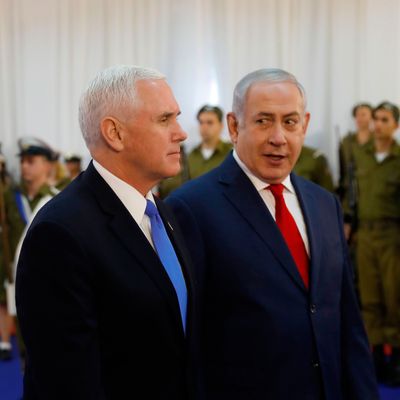
Vice-President Mike Pence’s long-planned and once-delayed trip to the Middle East lost its original rationale some time ago. Remember this?
Speaking in Washington in October, Pence said the president had charged him with a mission to the Middle East to bring an end to the persecution of Christians there.
“One of the messages that I will bring on the president’s behalf to leaders across the region is that now is the time to bring an end to the persecution of Christians and all religious minorities,” Pence said at the time.
Then, the administration announced its decision to recognize Jerusalem as Israel’s capital and move our embassy there. This offended virtually the entire Arab population of the region, including its Christians, whose leaders quickly made it clear that they weren’t interested in meeting with Mike Pence anytime soon:
Church leaders in Jerusalem wrote to Mr Trump begging him not to go forward with a move they said would “increase hatred, conflict, violence and suffering”. The pope of Egypt’s ten million Coptic Christians told Mr Pence he would refuse to meet him in Cairo as a result.
It’s just as well that Pence’s original plan to visit Christian Holy Land sites just before Christmas was shelved, ostensibly because he had to be in Washington to make sure the GOP tax bill was planned.
Pence’s scheduled trip to the West Bank city of Bethlehem and the birthplace of Jesus has reportedly been called off. The vice president was given a rebuke by the custodian of the Church of the Holy Sepulchre in Jerusalem, where Jesus is believed to have died, who said Pence would not be welcomed if he visited.
With the marketing of Pence’s trip as a rescue mission for persecuted Christians not exactly working out, the rationale changed to general efforts to promote the sort of peace-process breakthrough that the administration is claiming to be imminent, despite the many signs to the contrary. But before the original trip was canceled, Palestinian Authority president Mahmoud Abbas had already canceled plans to meet with Pence, as a protest of the administration’s embassy plans and the way the decision was handled. And Palestinian anti-Trump sentiment seems to be hardening:
During a two-hour speech in the West Bank city of Ramallah a week before Pence arrived, Abbas declared that “the deal of the century is the slap of the century” and confirmed that the Palestinian Authority would not accept America as a peace negotiator: “A believer shall not be stung twice in the same place,” he said. Trump decided to withhold $65 million from a United Nations relief agency for Palestinians, leaving many worried.
So, Pence’s trip has turned into a combination of damage-control meetings with the leaders of Egypt and Jordan, and an extended pep rally with the Netanyahu government of Israel. The latter is the real emphasis, as Emma Green notes:
[T]he trip became a photo op, a chance for Netanyahu to exclaim praises of “my good friend Mike” before the Knesset. At a greeting ceremony on Monday morning, the two men stood shoulder-to-shoulder, as politicians like to say, in front of rows of Israeli soldiers carrying M-16 rifles. They listened as a military band played “The Star Spangled Banner,” America’s national anthem, followed by “Hatikvah,” which is Israel’s.
Pence will head back to America on Tuesday having gotten at least one thing he came for: affirmation that the Israeli government is delighted with the Trump administration.
And maybe that’s all Pence really needs: a demonstration to his and the president’s conservative evangelical supporters that the U.S. is fully committed to Israel’s divinely ordained role in world salvation, and has a vision of “peace” that is co-extensive with a Greater Israel that rules or ejects the troublesome Arabs of the occupied territories.
You do wonder at what point American Evangelicals will begin to notice or care about the long-standing antipathy of their Middle Eastern co-religionists toward current Israeli policy — and toward Donald J. Trump. It’s true that in purely religious matters, there isn’t a lot of commonality between, say, Coptic Christians, with their ancient traditions and three-hour liturgies, and your average U.S. megachurch attendees, with their praise bands and stadium seats with coffee holders. But for a long time, Middle Eastern Christians have been treated mostly as symbols for the American Christian Right, as holy victims of the hated Muslims. Now, the idea of “Middle Eastern peace” is becoming mostly symbolic as well. What’s left is an increasingly exclusive alliance between the American and Israeli Right. God help anyone who gets in the way of that juggernaut.






























